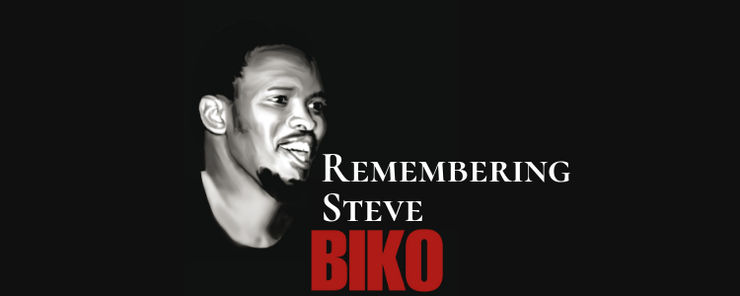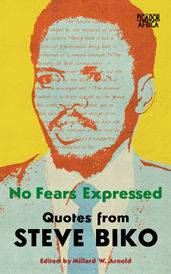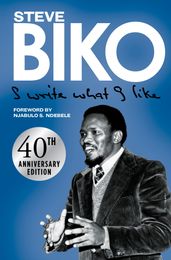Remembering Steve Biko
“We are looking forward to a non-racial, just and egalitarian society in which colour, creed and race shall form no point of reference.” – Steve Biko

It's been 43 years since the tragic death of the Black Consciousness Movement leader, Steve Biko. The month of September has since been marked to celebrate and honour Biko, who died in police custody on 12 September 1977. Today, we remember and honour his remarkable life.
Read a poem by Millard W. Arnold, extracted from , The Testimony of Steve Biko.
STEVE BIKO LIVES
A POEM
In 1978, a few months after Steve Biko’s death, Stevie Wonder called and asked Millard Arnold if he would accept the National Association for the Advancement of Coloured Peoples’ (NAACP) Image Award for Biko posthumously. Arnold was flown out to Los Angeles for the Eleventh Annual NAACP Image Award celebration at which he accepted the Stevie Wonder Perpetual Award in Biko’s honour. This is the poem Arnold wrote and read for the event.
They tell me Steve Biko is dead
To persuade me perhaps that his strong but sensitive voice can be stilled by hatred and fear
They tell me Steve Biko is dead
To show me perhaps that humanity and dignity can be bludgeoned into submission
They tell me Steve Biko is dead
To convince me perhaps that courage and compassion can be somehow compromised
But what they are afraid to tell me is that Biko lives
That the spirit, the ideals, the dreams, the glory of Steve Biko lives
That it lives in Soweto
That it lives in Watts
That it lives in Harlem
That it lives in the minds of all those oppressed
Steve Biko lives because the aspirations of a people cannot be denied
Steve Biko lives because violence and repression will not quench the thirst for freedom and decency
Steve Biko lives because his special sense of humanity and integrity cannot be forgotten
But they, they would have me, they would have you believe that Steve Biko is dead
You and I…
We know better
Here’s an edit of seminal books which mirror his life (for Steve Biko Month and beyond):
No Fears Expressed
by Millard Arnold
Immerse yourself in the profound wisdom of Steve Biko, the iconic Black Consciousness leader and activist, in this compelling compilation of his most powerful quotes.
First published in 1987, No Fears Expressed is a compilation of quotes taken from the words of the activist and Black Consciousness leader, Steve Biko. Sourced from the iconic I Write What I Like, including the collection of Biko's columns published in the journal of the South Africa Student Organisation under the pseudonym of 'Frank Talk', as well as from The Testimony of Steve Biko (edited by Millard W. Arnold), this book contains many inspirational quotes and thoughts that are still relevant in South African society today.
Biko's words fall under a wide range of topics including racism, black-white relations, remedies for apartheid, colonialism, black rage, and township life. All are topics that reflect the ever-present divide that exists between black and white South Africans.
His place in history is firmly cemented and the struggle that he gave his life for continues. He left a legacy of thoughts and words, and these words pay tribute to the courage and power of the young leader who was to become one of Africa's heroes.
I Write What I Like
by Steve Biko
I Write What I Like features the writing of the famous activist and Black Consciousness leader, Steve Biko. Before his untimely death in detention at age 30, he was instrumental in uniting Black Africans in the struggle against the apartheid government in South Africa.
This 40th anniversary edition includes a Foreword by Njabulo S. Ndebele, personal reflections on Steve Biko and Black Consciousness, as well as Biko’s first known published piece of writing. In addition, it features all the material of the original Picador Africa edition: a collection of Biko’s columns entitled I Write What I Like published in the journal of the South Africa Student Organisation under the pseudonym of ‘Frank Talk’; other journal articles, interviews and letters written by Steve Biko at the time; an Introduction by Nkosinathi Biko; a preface by Archbishop Desmond Tutu; and a moving memoir by Father Aelred Stubbs, which pays tribute to the courage and power of this young leader, who was to become one of Africa’s heroes.
The Testimony of Steve Biko
by Steve Biko
The 1976 SASO/BPC Trial: A watershed moment in South Africa's political history.
‘Millard Arnold’s book is a transcript of [Biko’s] extraordinary four and a half days of testimony. Aside from its value as a comprehensive record of Biko’s thoughts, it demonstrates his astonishing political agility: as a witness for the defence, Biko had to express his views in a way that would not hurt those on trial for agreeing with him.’ — ‘Black Pride’, David Ansen, Newsweek
When considering the most significant political trials in South Africa, the 1976 SASO/BPC trial is often overshadowed by the Rivonia Trial of 1956–61 and the Treason Trial of 1963–64. However, the SASO/BPC trial was perhaps the most political of them all, as it put the entire philosophy of Black Consciousness on trial.
The defendants, all members of the South African Students Organisation or the Black People's Convention, were in the dock for daring to think, to have opinions, and to envision a more just and humane society. As the trial unfolded, it became a test of the Black Consciousness Movement and its champions.
On May 2, 1976, Stephen Bantu Biko took the witness stand. Though known to authorities and serving a banning order, Biko was largely unknown outside his colleagues and the Black Consciousness Movement. His four-day testimony in the SASO/BPC case changed that, catapulting him from relative obscurity to celebrity status. Testimony of Steve Biko offers a powerful account of this watershed moment in South Africa's political history.


